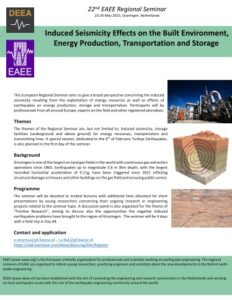Seminars
Regional Seminars
22nd EAEE Regional Seminar , Groningen, Netherlands, May 2023
Seminar
22nd EAEE Regional Seminar , Groningen, Netherlands, May 2023

Induced Seismicity Effects on the Built Environment, Energy Production, Transportation and Storage
23-26 May 2023
Zernike Campus, Groningen, Netherlands
21th Regional Seminar, Istanbul, Turkey, June, 2010
Seismic Assessment and Retrofit of Bridges
June 16-18, 2010
Işık University, Şile Campus, Istanbul, Turkey
• 20th Regional Seminar, Sion, Switzerland, September, 2001
• 19th Regional Seminar, Cairo, Egypt, December 1997
• 18th Regional Seminar, Lyon, France, September 1995
• 17th Regional Seminar, Haifa, Israel, September 1993
• 16th Regional Seminar, Stara Lesna, Slovakia, October 1991
• 15th Regional Seminar, Ravello, Italy, September 1989
• 14th Regional Seminar, Ossiach, Austria, September 1988
• 13th Regional Seminar, Istanbul, Turkey, September 1987
• 12th Regional Seminar, Halkidiki, Greece, September 1985
• 11th Regional Seminar, Granada, Spain, September 1984
• 10th Regional Seminar, Skopje, Yugoslavia, August 1983
• 9th Regional Seminar, Istanbul, Turkey, September 1982
• 8th Regional Seminar, Varna, Bulgaria, September 1980
• 7th Regional Seminar, Istanbul, Turkey, September 1979
• 6th Regional Seminar, Primorsko, Bulgaria, September 1978
• 5th Regional Seminar, Udine, Italy, September 1977
• 4th Regional Seminar, Istanbul, Turkey, September 1976
• 3rd Regional Seminar, Varna, Bulgaria, September 1975
• 2nd Regional Seminar, Bucharest, Romania, October 1974
• 1st Regional Seminar, Varna, Bulgaria, September 1973
Guidelines for Seminars
EAEE European Regional Earthquake Engineering Seminars
Adopted by the Executive Committee on 4 December 1997
1. The regional seminars are mainly organised to inform young researchers, practising engineers and scientists about the new developments in the field of earthquake engineering. The seminar may give a broad perspective concerning major issues related to earthquake engineering. However, special themes may also be selected and most of the invited lectures may be related to the selected theme with some lectures on general issues related to earthquake engineering.
2. The main part of the seminar is devoted to invited lectures with additional time allocated for short presentations by young researchers (preferably under the age of 35) concerning their ongoing research or engineering projects. Discussion sessions or special workshops can be organised on some selected topics. On the average 15-20 invited lectures (30-45 minutes) and 20-25 short presentations (10-15 minutes) may be considered as a starting point.
3. EAEE regional seminars are open to everybody who wants to participate and willing to pay the specified registration fee. Outside the invited lecturers no formal presentations or papers may be accepted or included in the program of the seminar. Depending on the program, young researchers (preferably under the age of 35) other than those nominated by their National Associations may be accepted to submit abstracts and to make short presentations during the seminar. A reasonable registration fee may be required from these additional young participants to cover the related expenses.
4. The duration of a seminar is decided among the Local Organising and EAEE Executive Committee. A regional seminar may last for one week (5 days) with morning and afternoon sessions. It is desirable to give a break for a half or full day in the middle to organise a field trip to historical or civil engineering project sites and to enhance the friendship among the young participants.
5. The other function of the regional seminar is to host an Executive Committee Meeting. If the Executive Committee Members are not among the invited lecturers, they need to be invited to take part in the Seminar and in the Executive Committee Meeting.
6. The financial side of a regional seminar needs to be covered by the host country and the host society. EAEE Executive Committee and Central Office will give full support to all related applications to any national or international organisation to obtain funds for the regional seminar. It is highly desirable that the host country or the host society supports all the accommodation and living expenses of all the young participants coming from abroad. This means accommodation and food for invited 15-20 lecturers plus the additional 1-2 Executive Committee Members and plus 25-30 young researcher coming from abroad. Some travel support can also be offered to lecturers and young participants depending on the budget.
7. Each EAEE Member Society may nominate two or more young researchers that can submit abstracts and take part in the seminar. However, depending upon the number of applications and financial conditions, with the preference given to those who have submitted abstracts, it is left to the organisers to decide about the total number of young participants. EAEE also recommends large number of local and regional participation to the seminar.
8. No formal proceedings of the regional seminars need to be published since most of the invited lectures are normally on topics that have already been published previously since the main purpose is to inform the participants about the recent state-of-the-art and practice. It is recommended that invited lectures should be written prior to the seminar and should be distributed to all participants in a suitable format. However, it is recommended to publish a formal Abstract Volume after the seminar containing the extended abstracts of the short presentations made by the young scientists and engineers.
9. The proposals to organise the European Regional Earthquake Engineering Seminar need to be submitted at least one year in advance to the Central Office to be approved by the Executive Committee during their next meeting or by postal balloting.
10. Upon the approval of by the EAEE Executive Committee, it is recommended that a Local and International Organising Committees should be established. The First Announcement should be distributed giving the exact dates for the seminar as well as the theme subjects for young scientists and engineers that would be interested in submitting abstracts at least nine months prior to the seminar.
11. The selection of the invited lecturers as well as the participants should be completed at least three month prior to the date of the Seminar.
